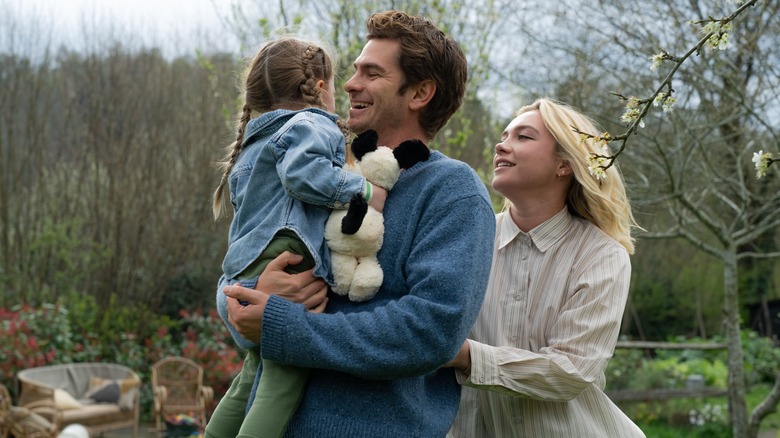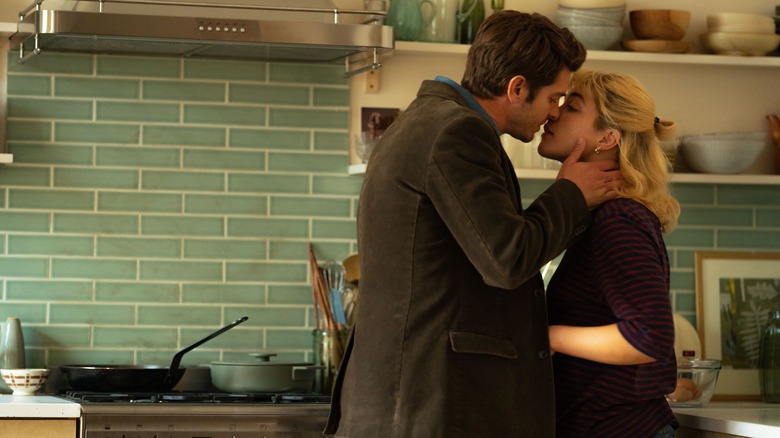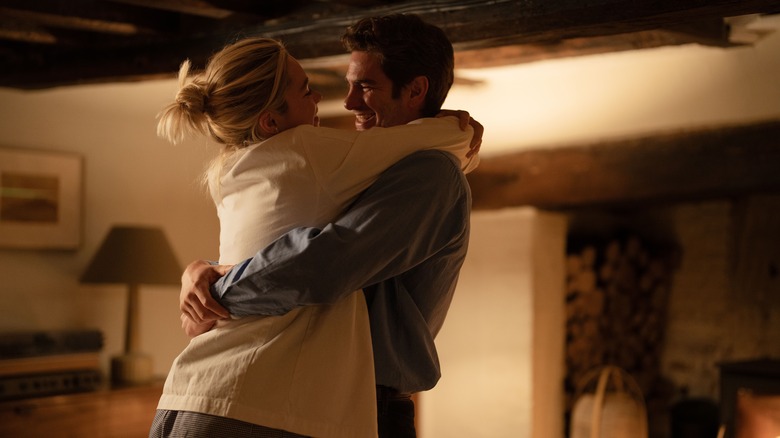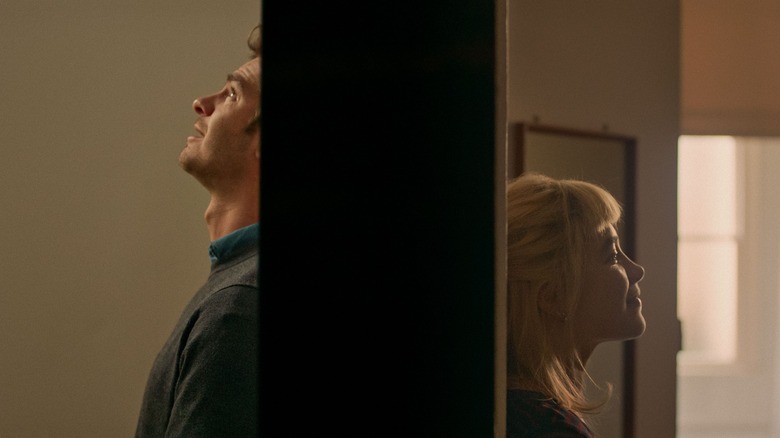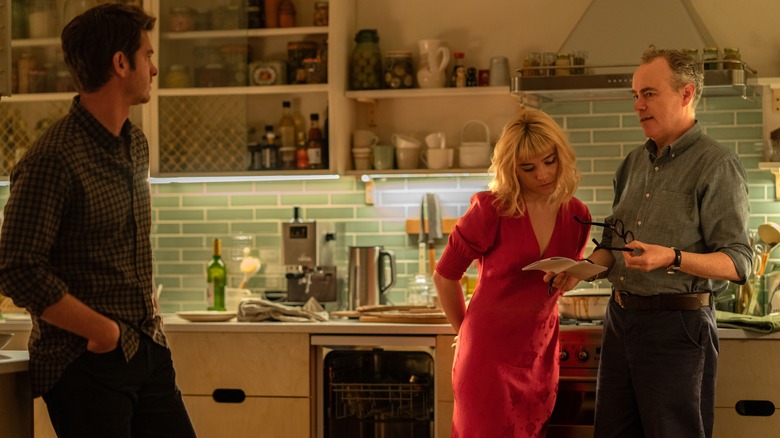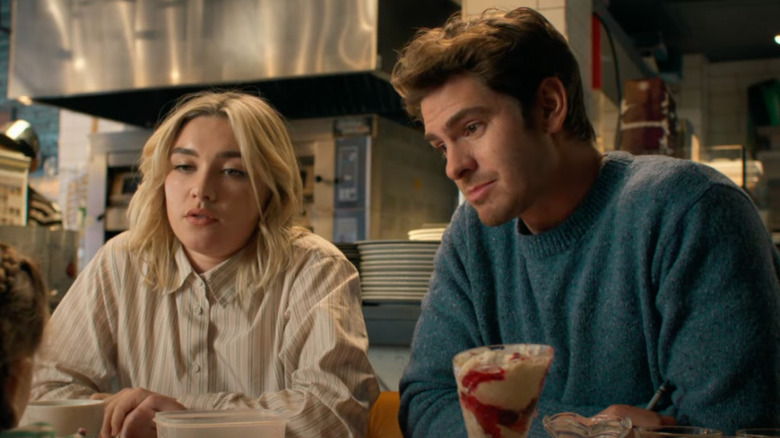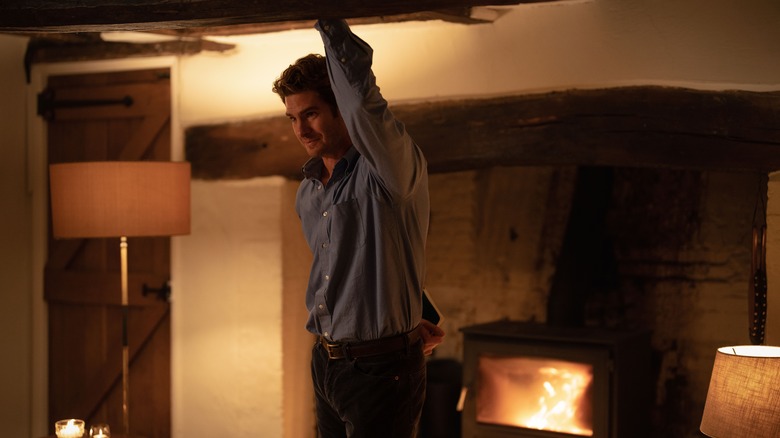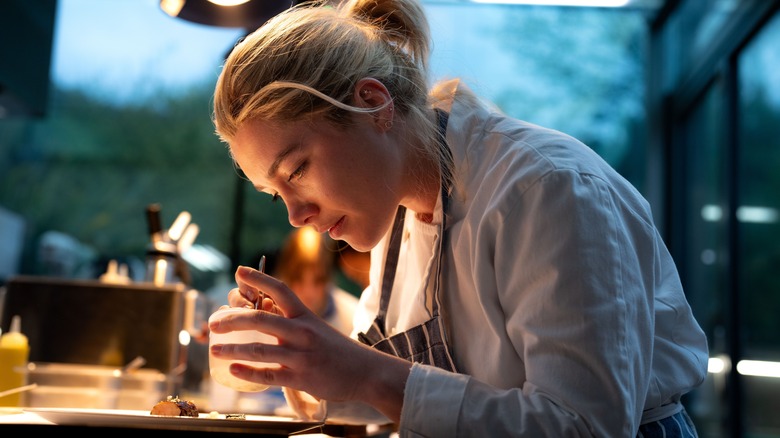We Live In Time Director Had A Physical Reaction To Shooting The Movie's Toughest Scene [Exclusive Interview]
When word came out that Florence Pugh and Andrew Garfield, two of the best actors of their generations, would be co-starring in a romantic drama distributed by A24 directed by "Brooklyn" filmmaker John Crowley, I basically reenacted the Vince McMahon meme in real time because of how much the combination of those elements fall squarely within my personal set of interests. The film, "We Live in Time," lived up to my self-generated hype: It's an intimate, small-scale relationship drama featuring terrific performances, and is exactly the type of stripped-down, human story that has fallen somewhat out of fashion as Hollywood has evolved into its current state.
I recently had the chance to speak with Crowley about the way the film jumps through time, finding the movie's musical identity, the most challenging scene to get right, and working with the mega-talented duo of Florence Pugh and Andrew Garfield. Crowley previously directed Garfield in the actor's first feature film, 2007's "Boy A," so he also gets into some nice memories of that experience and how Garfield has changed as a performer between then and now.
Note: This interview has been lightly edited for clarity and brevity, and contains spoilers for "We Live in Time."
John Crowley tells us what We Live in Time is really about
I rewatched "Brooklyn" because I knew I would be speaking with you, and I loved it when it came out and I loved it all over again on a second viewing. That movie is obviously a whole different thing than "We Live in Time," but they both have this really lovely quiet romance at the center of them. Did you learn any lessons from "Brooklyn" that you were able to incorporate into this movie?
That's the first time I've been asked that. Lessons? I don't know necessarily lessons, as much as they perhaps are both made from ... I wish to not simply capture romance in the film, which is another conversation. What I mean is, the romantic elements that some people really cherish in both films are a very happy side effect of the story that I was telling. You're inviting that stuff along, but it's not what the film's about and it's not consciously played by the actors. The actors are playing hitting their obstacles. And they're playing forming a life and falling in love with each other, and I think an audience is getting a degree of this swoon and yearning that is around that because it's been, in both cases, very truthfully played.
So I would say it's just an instinct in both instances to try and play the heart of the material and neither film shies away from emotion, it's true, and tries to steer clear of sentimentality or have a sort of cheap or schmaltzy emotion. But I have absolutely no problem with heartfelt emotion in films, and I have no time for the idea that it's sort of not cool or something like that. It's a bit unfashionable to go wear your heart on your sleeve, and I think that it's one of the great things about film: If it's truthful, it can really move a huge number of people.
You say that romance is not what the movie is about. Do you feel comfortable going on record or saying what you think the movie is about?
Yeah. Of course.
I'm curious what you think.
I think it's a film about two people trying to answer the question meaningfully, which is, what is a meaningful life in the face of a foreshortened life? If you are tapped on the shoulder and told, "Well, this big horizon that you thought you were having" — which is perhaps the case in "Brooklyn," but her complication is the pull of home and the second life, the ghost life she could have had, she's haunted by this split. In this instance, it's more they're busy making their life and getting on with it together and they're told, "Well, sorry, but it could be 12 months, it could be six months." And within that, that's one thing, that is a melodramatic event. The film is asking, "What's the best way to spend the time?", which is, "What's a good life?", really.
So that's a result. Posing that question, which is posed 10 minutes into the film in the big scene between the pair of them in the underground car park, it's not necessarily the stuff that you would think would invite in waves of romance, but of course it does, because actually they are two people who then proceed to squeeze a lot of joy out of life. And when you see the aspects of the relationship, the complication of the relationship, and all the facets, which is what the time jumps allow us to do, I think you feel that you have a complete portrait of a marriage by the end of it.
The movie's time-jumping was refined in post-production
I was actually going to ask you about the time-jumping element. I was wondering if you stuck to the script the whole way through or was there a moment where you said, "You know what? It might be more interesting to actually jump through time to this moment after this scene instead." Were you able to play with that at all in post-production?
Played a lot. I mean, the script already had a beginning, middle, and end as they say, as Goddard said, but not in that order. It was already shuffled, right? And then we shuffled it all the way around again. So it was broken apart and put onto the floor in the editing room and reassembled bit by bit. So the scene that was at the start is no longer at the start, it's three quarters of the way through. The very last scene of the film is no longer the last scene of the film.
Literally it just was — I don't want to say we started from scratch. There are three storylines running and they do have a forward traction in them, but the task became about, with those performances, how to make each scene speak to the one that's next to it in a way that was more visually eloquent and cinematically exciting in a way that we had to leave the script behind. Because the script did its own thing really beautifully. It was a wonderful blueprint and gave us all the pieces of this mosaic. But we then had to shuffle them and refine the logic for the film.
We Live in Time's music was a make-or-break aspect of the film
It seems like the music is extremely important in a movie like this, especially in those montage sequences where we're kind of seeing the relationship bloom and progress. And I was wondering what your approach was to working with Bryce Dessner on the score here and getting what you needed for those moments. I was kind of finding myself watching the film and thinking about what those sort of montage-y scenes might be like without music and thinking — it's a simple thing to say, but obviously the vibe would be completely different without music. So just for a film like this and the connective tissue of the scenes that you're working for, what do you need musically?
Well, it took us a long time to find the musical identity, is the simple truth. Before I met Bryce, for probably the first 12 weeks of the edit, I had a music supervisor who was trying lots of different pieces of music on all of these sequences in order for me to define kind of what I was looking for, really. And it was hard, because you put the wrong piece of music on this film and it screams out. It's horrifying. It's awful. It suddenly makes it lesser and it makes it a different kind of film. It would squeeze it into a kind of rom-com or I don't know, it was turning into all these kind of non-films. So it was almost like a via negativa, it was like, "Well, I know it's not that, it's not that, it's not that, it's not that."
I met Bryce and was a huge admirer — I loved The National, of course — but also a huge admirer of his score work and of his classical work, which is a different sort of strand to what he does. He had a very, very strong visceral reaction to the film and he loved it and it was palpable and he was excited about the possibilities of what the score could bring to it. He didn't talk a great score then. He didn't necessarily go, "And it should be this!" It was sort of like, "It could be this, could be that." And I loved that. I loved the fact that he was willing to then start and go on the journey.
He sent me a huge amount of music in quite a short period, which is his response or responses to the film. He didn't start on the first scene and go, "This is the first piece of music for the first scene." So it became about then trying almost like these pieces of music on this lattice work as it were, trying to see, "Okay, that goes there, that goes there."
About maybe four weeks into that process, the piece that emerged, which didn't have a huge number of champions in those around me in the editing room, is the main love theme. It's the one at the very start and it's the one when they're back-to-back in the doorway, the leaving the flat montage, and then the very end with the breaking of the eggs. I thought it was an exquisite melody and quite an unusual melody. But the way the original piece was, it didn't sit on the film very well. It was a little bit too sad, almost. It was quite a melancholy, dark piece of music, almost.
But it sat between a sort of happy place and a sad place, the actual notes. It felt like it was doing the two of those things at the exact same time in a way that I thought was exquisite. So I asked him to rework it and he did, and he did various different versions, a couple of different scales. Then that began to emerge as a beautiful three-point spine for it. And then other pieces, he noodled, he played, he came to London, we sat together in front of the film, he got out the guitar and sometimes he would play along to try and see "Is that the vibe?" and get that.
Then sometimes on some of the abstract pieces where it was, "Look, I think we need to go beneath melody, it needs to be almost more ambient here." He did a bunch of that in the room as well and took it away and then took those ideas and made it, which was just sort of blocks of chords moving into each other, but allowing the space for the emotion in the scene to shimmer. So that was the process. It was incredibly rich and happy and playful. And then you come to AIR Studios and watch it being recorded, which is always the biggest thrill in the filmmaking process, is to hear an orchestra bring it to life while watching those images.
John Crowley had to essentially teach the audience how to watch this movie
So speaking of process, in a movie like this, when you're not dealing with tons of visual effects and the attention is more on relatable human drama between characters, what are the biggest challenges for you as a director? Is it knowing when to employ a close up? What kind of things keep you up at night during production on a movie like this?
You don't have as many tricks in your bag to hide behind. So if something's not truthful, if something's not clear and you can't make it clearer, you are exposed, as it were. Especially in a film which is structured in this way, which is jumping around in time, you want that — I wanted that — to feel fluid, and for the first 10 minutes, maybe, for an audience to go, "What's the story with this?" And you could feel the uncertainty. And then it settles down to begin to reveal that there is a form and a structure to the unfurling of events. And about for the last 25 minutes or so, you're just fluidly flowing between different realities. That was the intention.
It took a long time to get there. So while you're not there, you're not anywhere. You are in a space of running into roadblocks and two scenes that won't sit together very well, and a chunk of information. And of course you are running three timeframes against each other, one of which is essentially from the very first point that they meet to the point that they say goodbye, which is kind of five years overall; one of which is the year of her second diagnosis, which is through the cooking competition; and one of which is the day of the birth.
So you've got these three different timeframes running against each other that have different paces, and the day of the birth is all about waiting. So you can have these big lurches of plot and then suddenly you go back to see when nothing's happening. Well, that scene is going to look like it's demanding to be cut, because it's like, "Nothing's happening." So that took a lot of work to know how to almost educate an audience very quickly as to how to accept a scene in which people just sit in the bath eating Jaffa Cakes as a scene and enjoy that for itself, and that is the point of it and the purpose of it. Music helped with that, placement of it helped, and a certain kind of confidence of, "This is what this day is about." So subtly making a viewer aware that you can be in on the joke with this, because then suddenly they're out of time and they're in a petrol station and it's Croydon in South London and it's game over. [laughs]
That's wonderful.
The birth scene was the most challenging thing to shoot
Can you put your finger on a scene that was the hardest to get right for you? Something that just was not working, but you eventually were able to figure it out?
You mean in the edit, or on the shooting?
Actually, I guess during shooting.
Oh boy, that's a tough one. I mean, look, there were some huge technical issues. The ice was very difficult because every time you want to go for another take, you're walking on ice crampons onto the ice. I mean, the actual reality of shooting a sequence like that, which is not a very long sequence, but on ice with actors who don't skate, is challenging. It's just hard. But they were wonderful and they kept the playfulness of what was needed up with that. And everybody's moving on ice and of course it goes wrong. It goes bad. It's like we're shooting on water or something.
I would say the big birth scene was the biggest emotional [challenge] — that was over two days, and there was so many elements in that, technically, that we were obsessed with. We had a midwife on set, we had a prosthetic, and then of course at the last minute, you introduce an actual real baby. I remember going into the shooting of that with my head hot with the quantity of things that you are thinking could go wrong here and you're trying to anticipate. When we were about halfway through the scene, I could actually watch the scene and watch the material, I was like, "Oh my God, this is really special. This is what they're playing, and the way in which they're revealing the heart of what's going on in this scene, it's really working. It's yielding." That was thrilling. That was really exciting.
Yeah, I've never seen anything quite like that before, so you definitely pulled it off there. That was very impressive.
This is Crowley's second time working with Andrew Garfield
Florence is amazing in this movie, especially in that scene, but she's asked to do so much and be so vulnerable here. I'm also curious about your reunion with Andrew Garfield. Tell me about reuniting with him all these years after "Boy A," your first collaboration together. Has he changed as an actor at all?
Yes and no. I mean, he's the same creature in lots of ways. When he was doing "Boy A," it was the very start of his career and it was his first leading role and he was like a very scared boy in lots of ways. He was 22, 23, and he was playing a broken child. He was playing a damaged young creature. But there was a lot of fear in him, in Andrew. He was this young man who full of energy, but with this sort of degree of terror, I think, almost as to whether he was going to get the life he wanted or not and the career he wanted, and there were no guarantees. He wasn't Andrew Garfield yet. He was just this kid who everybody was impressed by.
So he was able to use that churn of emotion in the role in a way that was heartbreaking, and he was technically dazzling when he needed to be, when the chips were down on a shoot, which had no time like that. I remember the last shot of the film, a close up on his face when he was on that pier. They were trying to kick us off the pier and the producer said, "Can we cut around it? Is there something else?" I was like, "It's the last shot of the film, what are you talking about?! We can't cut around it." And [Andrew] just jumped up on an apple box, pointed the camera, shot a take. It was dazzling. I pushed my luck and said, "Let's go for one more." He did two, and it was two bullseyes. Boom, boom. And that's a very particular thing when, under that kind of pressure and stress, somebody can come and do something as emotional as that in close up. It was like, "Wow." And that was towards the end of the shoot. So I was already like, "Okay, this guy is really special."
Now, 17 years later, he's a man. He literally is, in the sense that emotionally, he's matured and grown. But the creature that he was, that degree of intensity with the work has just grown in him and his curiosity, and he still has a hunger to kind of get at the real work. There's a restlessness in him, and not a perfectionism, because perfection is just that there is a perfect answer. It's more like he's really trying to get at something better behind the scene all the time. And not an in neurotic way, in a way that's really trying to just gently open it.
So it's once again about giving him the space, literally, and clearing his eye line in order for him to connect with a moment, and in this instance, connect with his fellow actor as well, because the connection between them is so profound. But he was technically good when he was 23. Now, he's dazzling. He's like an athlete in terms of what he can do physically, and his understanding of what he's doing, while he's got a huge raw emotional range to play with as well.
Why Florence Pugh is like a 'heat-seeking missile'
I think I probably have a minute and a half left with you, but I did want to ask about Florence and what kind of conversations you had with her before she signed on. Because like I said, this is such intimate role for her.
She's very direct, Florence. She was like, "This is great. I love it. I want to do it. Yeah." It was very, very — in a weird way, it was like, "Really?" And I almost didn't trust that it could work out, because the first time we called about Florence, she was not available because of the Marvel movie, and then that slid back and she got eight free weeks and she was in. And she was very keen to shave her head, that was in our first conversation. I was like, "Wow, that's amazing," because I had assumed that an actor who was going off to do a huge superhero franchise movie would not shave it all off. But she was absolutely adamant about it, which is fantastic.
She has a truth instinct, she's like a heat-seeking missile. She goes straight to the heart of something. She doesn't like to over-talk about it, she doesn't like to intellectualize, she wants to do it, get on with it. She loved rehearsals with Andrew, and I think that allowed them both the space to find each other. We had two weeks' rehearsal, and it helped that they really liked each other, which is great. And it just allowed them to study the map of the territory before they had to climb the mountain, as it were. They just understood what all these scenes were so, under pressure on the day, they could really dial it up and go for it emotionally.
"We Live in Time" is in theaters now.
